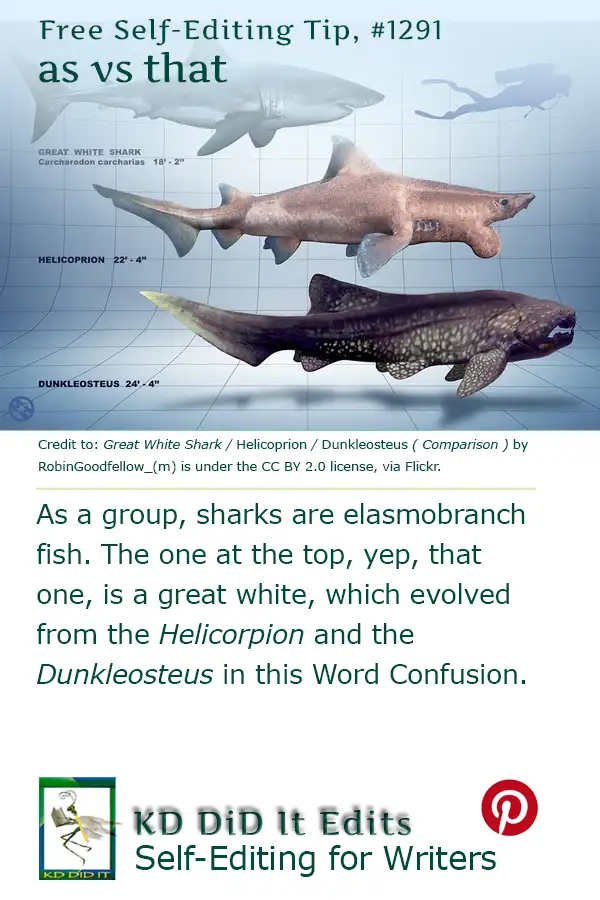This word confusion as versus that is part of the as series and explores as and that as adverbs, conjunctions, pronouns, and relative pronouns.
As is most commonly used to compare someone or something but is not exact.
That is the exact same someone (or something). It will be the same that, that was discussed in another part of the sentence.
Source: Straus, Keleraq, Bernadette
Exploring Later . . .
You may also want to explore “Nope, It’s Not As You Like It“, “As versus Because“, “As versus For“, “As versus Since“, and/or “As versus Whether“.
You may be interested in “Which is That?“, “Who ‘Dat?“, and/or “This (These) vs That (Those)“.
Word Confusions . . .
. . . started as my way of dealing with a professional frustration with properly spelled words that were out of context in manuscripts I was editing as well as books I was reviewing. It evolved into a sharing of information with y’all. I’m hoping you’ll share with us words that have been a bête noire for you from either end.
If you found this post on “As versus That” interesting, consider subscribing to KD Did It, if you’d like to track this post for future updates.
| As | That |
|---|---|
| Part of Grammar: | |
 — |
 |
| Adverb; Conjunction, causal; Pronoun; Relative Pronoun
NOTE: This post is not exploring the prepositional definition of as. |
Adverb; Conjunction; Pronoun; Relative Pronoun
Plural for the pronoun(s): those |
| Check the Punctuation page for information on comma usage for: | |
| as | that |
| Adverb: Answers how, why Introduce a clause using:
Conjunction, causal:
Indicates by comparison the way that something happens or is done
That (introduces a subordinate clause expressing a statement or hypothesis)
Pronoun: [New England, Midland, and Southern US] Who
[Chiefly dialect] After a substantive not modified by same or such Relative Pronoun: That, which, who |
Adverb: To such a degree
Conjunction: [Causal] Introducing a subordinate clause expressing a statement or hypothesis [Causal] Expressing a reason or cause [Causal] Expressing a result Pronoun:
Referring to a specific thing previously mentioned, known, or understood [Often with clause] Used in singling out someone or something and ascribing a distinctive feature to them Relative Pronoun:
|
| Examples: | |
| Adverb: He was angry, but she was just as angry. “On Saturday, June 1, Madsen, 32, shared a heartfelt post on her Instagram account, sharing some artwork celebrating the LGBTQ+ community, as well as an historical photo of a march following the Stonewall Riots” (Phillipp). “People began lining up as early as 4 a.m. to cast their ballots at the consulate office in the 2400 block of West 6th Street, near MacArthur Park” (De Leon). Conjunction: She spilled the milk just as she was getting up. I met him as I was leaving. Pronoun: Them as has gets. “. . . that kind of fruit as maids call medlars . . .” –William Shakespeare He is a foreigner, as is evident from his accent Relative Pronoun: She lived in the same building as my brother. “. . . tears such as angels weep . . .” –John Milton He is such a man as I honor. My position is the same as yours. I received the same grade as you did. Those as want to can come with me. |
Adverb: I would not go that far. It was that big, perhaps even bigger. He wasn’t that far away. Conjunction: I eat that I may live. Oh that he could be restored to health. She said that she was satisfied. It is possible that we have misunderstood. He seemed pleased that I wanted to continue. She was so tired that she couldn’t think. Pronoun: This is stronger than that. That’s a good idea! What are we going to do about that? His appearance was that of an undergrown man. They care about the rights of those less privileged than themselves. Relative Pronoun: Nineteen sixty-five is the year that Anna was born. This is the book that we want. |
| History of the Word: | |
| Middle English as a reduced form of the Old English alswā meaning similarly. | Old English thæt, nominative and accusative singular neuter of se meaning the is of Germanic origin and related to the Dutch dat and the German das. |
C’mon, get it out of your system, bitch, whine, moan . . . which words are your pet peeves? Also, please note that I try to be as accurate as I can, but mistakes happen or I miss something. Email me if you find errors, so I can fix them . . . and we’ll all benefit!
Satisfy your curiosity about other Word Confusions on its homepage or more generally explore the index of self-editing posts. You may also want to explore Book Layout & Formatting Ideas, Building Your Website, Formatting Tips, Grammar Explanations, Linguistics, Marketing Help & Resources, Publishing Tips, the Properly Punctuated, and/or Writing Ideas and Resources.
Resources for As versus That
Some of these links may be affiliate links, and I will earn a small percentage, if you should buy it. It does not affect the price you pay.
Apple Dictionary
Bernadette. “As vs That in this sentence.” Stack Exchange. 8 June 2015. Accessed 6 June 2024. <https://english.stackexchange.com/questions/251245/as-vs-that-in-this-sentence>.
De Leon, Anthony. “Hundreds of Voters Cast Ballots at Mexican Consulate in Los Angeles in Historic Presidential Election.” Los Angeles Times. 2 June 2024. Accessed 6 June 2024. <https://www.latimes.com/california/story/2024-06-02/hundreds-of-mexican-nationals-turn-out-at-consulate-in-los-angeles-to-cast-ballots-in-historic-presidential-election>.
Dictionary.com: as
Keleraq, Raad. “‘As’ and ‘That’.” English Language Learners. Stack Exchange. 16 Sept 2015. Accessed 6 June 2024. <https://ell.stackexchange.com/questions/67602/as-and-that>.
Khurana, Anjali. “English Grammar: What part of speech is ‘as’?” Quora. 2012. Accessed n.d. <http://www.quora.com/Grammar/What-part-of-speech-is-as>.
“Like and As.” English for Students. n.d. Web. 28 May 2012. <http://www.english-for-students.com/Like-and-As.html>.
Merriam-Webster: as
Phillipp, Charlotte. “‘Bridgerton’ Star Jessica Madsen Says She’s ‘in Love with a Woman’ in Pride Month Post.” People. Yahoo News. 1 June 2024. Accessed 6 June 2024. <https://ca.news.yahoo.com/bridgerton-star-jessica-madsen-says-015425520.html>.
“The Relative Pronouns What, As, and But.” English Grammar. 2 Aug 2011. Accessed 6 June 2024. <https://www.englishgrammar.org/relative-pronouns-2/>.
Straus, Jane. “Tackling More Tricky Word Choices: As, Because, and Since.” Grammar Book.com. n.d. Web. 6 May 2021. <https://www.grammarbook.com/blog/effective-writing/tackling-more-tricky-word-choices-as-because-and-since/>.
Pinterest Photo Credits
Great White Shark / Helicoprion / Dunkleosteus ( Comparison ) by RobinGoodfellow_(m) is under the CC BY 2.0 license, via Flickr.


